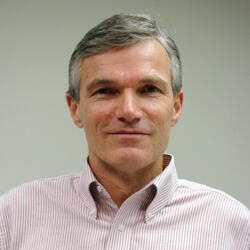Dept. of Materials Science and Engineering Fall Seminar Series: Scott Barnett

Description
Scott Barnett, a professor in the Materials Science and Engineering Department at Northwestern University, will give a talk titled "High-Efficiency Energy Storage Using Reversible Solid Oxide Cells" for the Department of Materials Science and Engineering.
Abstract:
Electrical energy storage is a key technology needed for enabling increased utilization of renewable wind and solar energy resources, as needed for mitigation of CO2 emissions. While many technologies are being considered, the grid "load shifting" application – storing excess electricity for several hours until there is demand – remains challenging. This presentation will discuss the use of reversible solid oxide cells for such grid-scale energy storage. One approach is to electrolytically produce a fuel that can subsequently be used for, e.g., transportation. Another approach is similar to a flow battery – a fuel is first produced by using the solid oxide cell in electrolysis mode, stored, and then on demand converted back to electricity using the solid oxide cell in fuel cell mode. These approaches can provide large energy storage capacities when coupled with large-capacity storage of the product gases. Usually this involves steam electrolysis and storing the energy as hydrogen. Another method that can yield a high round-trip efficiency > 70% is also described, utilizing a storage chemistry where the fuel cycles between H2O-CO2-rich and CH4-rich gases. For electrolysis and reversible application, however, improved solid oxide cells are needed that can provide useful current densities at relatively low overpotentials. In order to be economically viable, they should operate for long times and many thousands of storage cycles, and hence it is important to avoid degradation mechanisms often observed during solid oxide electrolysis. The second half of this talk describes recent work done on developing improved solid oxide cells and studying their long-term stability in electrolysis mode and under reversing-current cycling. Key degradation mechanisms including oxygen electrode delamination and Ni migration in Ni-YSZ fuel electrodes will be discussed.
Who can attend?
- Faculty
- Staff
- Students







